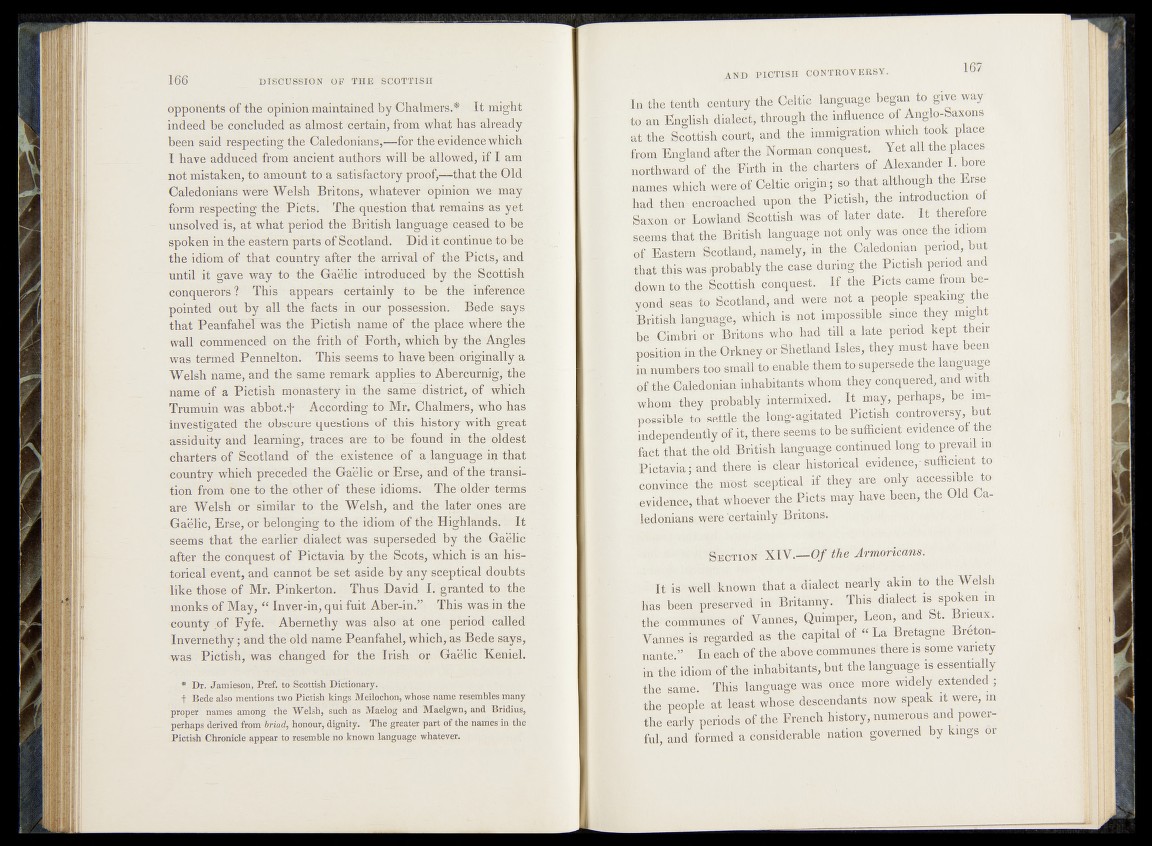
opponents of the opinion maintained by Chalmers.* It ‘might
indeed he concluded as almèsi 'certain, from what has already
been said respecting the CaledomanSP^f&r the evidenceyfhich
I have adduced from ancient authors will'be allowed,rif I am
not mistaken, to amount to a satisfactory proof,—that the Old
Caledonians were Welsh Britons, whatever opinion we .-may
form respecting^the Piets! The question that remains as yet
unsolved is, at what period the British .language eeasedHo be
spoken in the eastern parts of Scotland. Did it continue to be
the idiom of that country after the arrival of the Piets-,4 and
until it gave way to the Gaelic"introduced by the Scottish
conquerors ? This appears certainly to be the inference
pointed out by all the facts in our possession. Bede ‘S-ays
that PeanfaheTwas the Pictish name of the place where tlie
wall commenced on the frith of Forth, which by the Angles
was termed Pennelton. This-seems to have been; originally a
Welsh name, and the same remark applies rto Abercurnig, the
name of a Pictish monastery in the sème'district/of which
Trumuin was abbot.f According to Mr.:Chalmers, who has
investigated the obscure questions of this history with'great
assiduity and learning, traces are to- be found in the oldest
charters of Scotland of the existence of a langüa^ëdndhat
country which preceded the Gaelic or Erse, and of the transition
from one to the other of these idioms. The older terms
are Welsh or similar to the Welsh, and the later ones are
Gaelic, Erse, or belonging to the idiom of the Highlands. It
seems that the earlier dialect was superseded by the Gaelic
after the conquest of Picfovia by the Scots, which is an -hisk
torical event, and cannot be set aside by any sceptical doubts
like those of Mr. Pinkerton. Thus David I. granted to the
monks of May, “ Inver-in, qui fuit Aber-in.” This was in the
county of Fyfe. Abemethy was also at one period called
Invernethy ; and the old name Peanfahel, which, as Bede says,
was Pictish, was changed for the Irish or. Gaelic Keniel.
* Dr. Jamieson, Pref. to Scottish Dictionary*
f Bede also mentions two Pictish kings Meilochon, whose name resembles many
propel! names among the Welsh, such as Maelog and Madgwn, and Bridius,
perhaps derived from briad, honour, dignity. The greater part of the names iû the
Pictish Chronicle appear to resemble no known language whatever.
In ithc^tfenth century th e Ce$ff$ - la n g ^ g e began to give way
-to,-an English d i a T ^ l ^ p u g h the of Anglo-Saxons
d fe th ^ to ttis h r e p u r t, and tkq/immigr^on-'which took place,
from England after th4,N-©r?ma^ e o n q u ^ i , , iYet all the places ,
i ih r th w a r d th e s F i r t h in Alexander I , bore.
had ^pon^ t^ P ic tis h ,ith ^m tto d u c tio n of
Saxohtp^Eowlapdi#cfW»sJii w a s ^ k te r date: I t therefore
noj|^n%' was.pHfte % # o m
^ .E a s te rn Scotland, namely in the Calqdp^iaik, period, but
‘that .tfos-was /proba>iyrtherfp s^ d u rin ^ the Pic ,tip p e r id* and
drvy?rtft j I f Ae
vyond?4©apr S c o t l a n d / and wer^,h©t ,‘avpegpl% speakpag t ^ ,
B r i t i s h i m p a s s a b l e lEey m.ight'
..beiigimbrijpr Brifops^who had till a^ late ^ | ) t
position in>thet Orkney of ^Shetland
ha n um b ^ E S r tif ^ ^ l ^ e n a b le them^qfspiei^ede th^lpngupge
,pf J»ke Gakdanian inhabitants w h o i^ l^ y ^ p q u e ^ ^ arid with
possibk\t^s)itW^thed®nfeagit.ated Pictish Pept^fp|s,y;, b u t
independentlylofp^l^T^s^ms %(be s-ufEcie^|f d^idepeeiGu the
jfact that-the old British la h g u ^ q q n tin u e d frevad-un
Pict,aw|:arid-tjieiei is clear historical , evidep^e,; suffiqiynt ,tpt
sceptical j B B — i
. evidencerthat whoever the Piets may hayefo;§en, the Old Ga-
ledoniansi.were 'certainly BritQps.,,
SectiM XIV.—0 / the JrrfioriCdns.
I t is well,known that a dialect nearly akin to the Welsh1
Kas been presented- in Britanny. This dMeet,,tf‘spoken in
the communes of Vannes, Quimpeip-.fcfon, and St. g g j l l
Vannes is regarded as the capital of ■ La B r e t o ,« Breton-
nante.”'^ In each of thekbo^e-communesHhere is sbme variety
in the idiom of the inhabitants, but the language is essentially
the same.r This language WasTqnce more widely- extended ;
the people at least whose descendants now speak it were, m
the early periods of the French history, numerous and powerful,
and formed a considerable nation governed by kings . Or